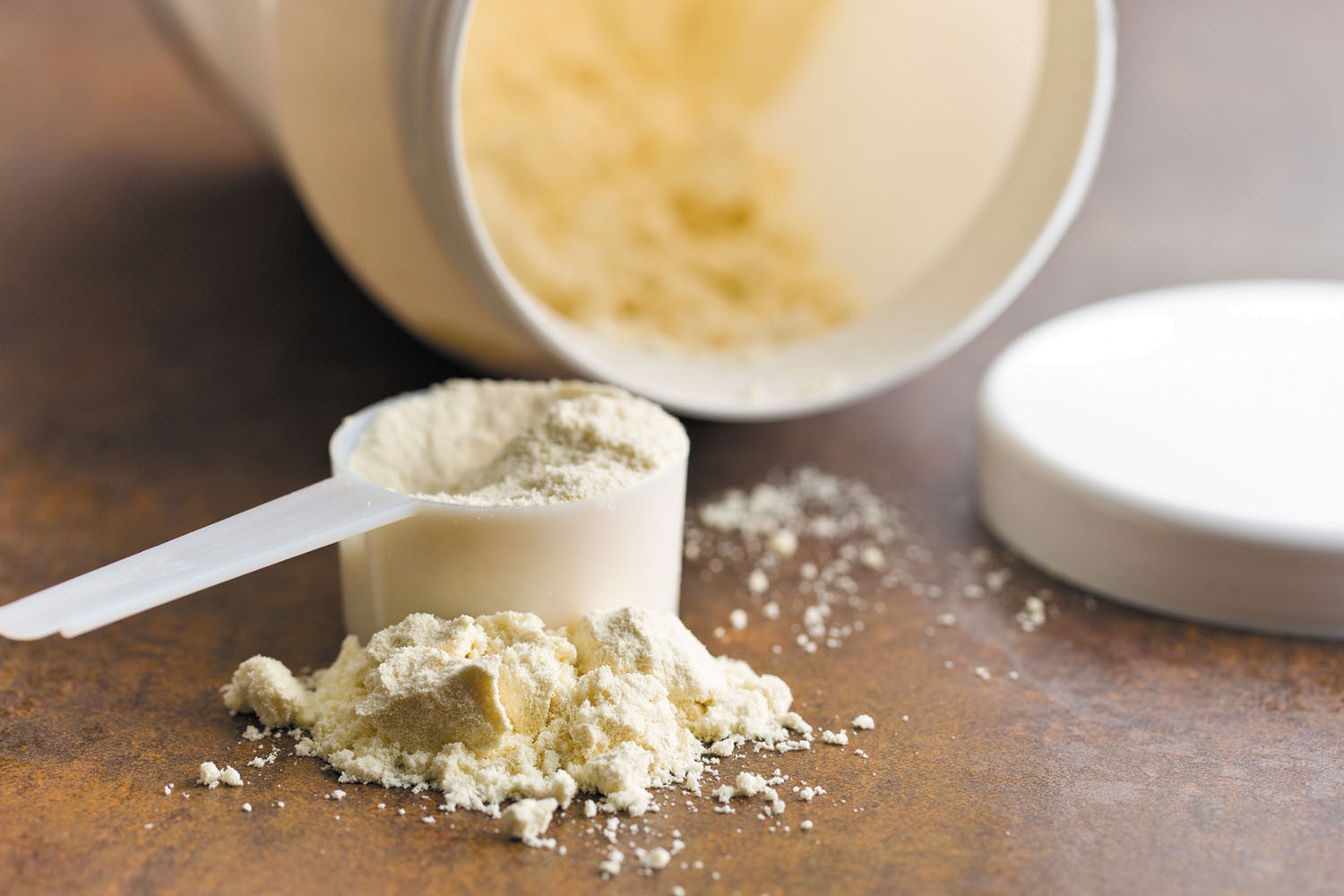
All About Protein Powders- And The Cleanest Protein Powder That No One Is Talking About
“Protein” is probably the most popular word in nutrition today, and “protein powder” the most popular nutritional supplement. And rightfully so- protein is the most important component of our food. Besides, being the building block for all our body tissues, protein is essential for practically every process in our body. Although to be fair, its popularity has more to do with its role in muscle building and weight loss. Either way, whatever the motivations behind your quest for protein, it’s one of the most important components to your overall health and it’s great news for your body if you’re ensuring you get an adequate amount.
““Because of their extreme versatility and broad range of benefits.. amino acids are truly the “Swiss army knife” of nutrients.”
Ben Greenfield, world-renowned health coach and bestselling author
What makes protein supplementation all the more popular and necessary in our country is that Indians are predominantly vegetarian. It’s well known that the best source of protein is animal foods and It’s difficult to get protein from plants.
What’s In Your “Protein Powder”?
Whey
The default and most popular option is whey protein. It is derived from milk. Whey, by itself, is not bad and is a fairly good protein source. Being an animal-based source, it has a high bioavailability(absorbs well) and contains all the essential amino acids(protein components).
But as with most products that become too popular and commercialized, the biggest issue with whey protein supplements is that they are now so highly industrialised. Because of this, the vast majority of products on the market all contain processing additives like cheap fillers, thickeners, chemical flavorings, artificial sweeteners, etc.
Although far and few, there do also exist clean whey protein products- without any additives. This is what you should get if opting for whey protein. Also, preferably one that is sourced from healthy pasture-raised animals.
One other issue with whey, due to it being derived from milk, is its tendency for food sensitivities and allergies. A lot of people, usually ones with dairy intolerance, don’t tolerate whey well. Although better in comparison to casein, the other form of protein present in milk that is responsible for most of the dairy intolerance issues, whey also can still cause issues.
Pea And Other Plant Proteins
These are getting more popular by the day due to the shift towards vegan and plant-based diets in the urban population(not a positive thing [1]). They provide an alternative for individuals who suffer intolerance issues with whey. A lot of people report not experiencing bloating and other digestive issues that they did with the standard whey protein powder. However, plant protein sources in general are always inferior compared to animal sources and you should avoid them as your primary protein source due to the following reasons:
- Plant protein sources have low bioavailability.
- They have incomplete or sub-optimal amino acid profiles.
- Lastly but perhaps, most importantly, plants contain “anti-nutrients” or defense chemicals like phytates, lectins, and enzyme inhibitors that are not only harmful to the gut and overall health but also inhibit protein absorption thus further reducing bioavailability. Plant proteins are often marketed as “clean” protein sources owing to them being dairy-free but they’re often much worse due to this reason.
Pea has long been the industry standard food source of choice for vegan protein powders. But recently(with industrial processing advances and plant-based diets getting popular) a whole host of other options like rice protein, soy, hemp, legumes, chia, sunflower seeds etc have cropped up. Most modern plant protein supplement products utilize a blend of multiple sources.
Hydrolyzed Animal Proteins
This form of protein powder is far less popular than the above two, especially in our vegetarian-dominant country. But it’s superior to them in terms of nutrition and health, and a super clean protein source. While a good clean additive-free whey protein powder is still a great animal-source protein supplement, it still has the tolerability issues due to being derived from dairy as we mentioned.
Hydrolyzed animal protein is meat that has been processed by boiling in hydrochloric acid and then neutralising the products, to offer you a kind of a partially pre-digested form of animal meat that is shelf stable. So nutrition-wise, it’s kind of like having a piece of steak in powder form. [7]
Hydrolyzed meat powders are used in all kinds of foods like nutrition bars, infant formulas- even as flavour enhancers!
If you can get a good hydrolyzed meat protein product without harmful additives and one that is sourced from healthy pasture-raised animals, then you probably have yourself the perfect protein supplement.
But- this isn’t the cleanest protein source that we’re talking about in the title. We mean, what if you’re allergic to even meat? There are still actually better options.
Essential Amino Acids- Getting Straight To The Money
It’s 2023 and science and technology have progressed far further than just converting your meat into dried shelf-stable powder. What if we could directly get the end-products of protein digestion i.e. the constituent amino acids directly? We mean, we already get the end products of carbohydrate digestion i.e. glucose in refined edible forms. And thanks to the popularity of ketogenic diets, we now have exogenous ketones(end products of fat digestion) available in stores too.
So yes, we definitely can get ready-to-consume amino acids and that’s basically what an essential amino acids supplement consists of.
There are 9 essential amino acids in total. What “essential” signifies here in terms of biology is that these amino acids cannot be produced by the body endogenously and must be obtained externally from food. The 9 essential acids include:
- Histidine
- Isoleucine
- Leucine
- Lysine
- Methionine
- Phenylalanine
- Threonine
- Tryptophan
- Valine
Some of the main benefits of getting amino acids directly in consumable form are pretty obvious going by the issues we discussed above with other protein supplements. But let us go through all the benefits of this amazing modern solution for protein supplementation:
Clean as a whistle- no food sensitivity or reactions
Since you’re getting the amino acids of protein directly, there is no scope for any of the potential issues that we have with food-based sources like whey or pea- no antinutrients, no food sensitivity or reaction issues, and no digestion issues.
Easily digested
Amino acids are the end-products of protein digestion and absorption. So your body does not need to do much work to utilize them. This makes it especially suited to older people and people with failing health who may have trouble digesting and absorbing protein.
Complete bioavailability
Since they’re pre-digested, amino acids are completely absorbed and thus have a bioavailability of almost 100 percent. Even good animal-based sources of protein have limited bioavailability and it is subject to the individual’s digestion and absorption capacities.
The travel-friendly protein supplement
Here’s one of the best parts of an EAA supplement: compared to the standard protein powder, you only need around one-fourth! Studies show that due to the enhanced digestibility and bioavailability of supplemental EAA, as little as 3g can stimulate the same amount of muscle growth as 20g of whey protein powder [5].
Standard serving size dosages of EAA supplements range from 5-12g only.
You control exactly what you’re getting
Unlike food sources of protein where the amino acid profile or the ratio of different amino acids present is fixed by the natural composition of the food, we can control exactly how much of each amino acid we’re getting in an EAA supplement. Although, most of the research points to the most favorable ratio being somewhere very close to the natural composition of animal foods. However, certain minimal alterations aimed at specific goals can be hugely beneficial. More on ratios later.
- Quality protein for vegans- finally
We don’t recommend a vegan diet because it is not optimal for health. But modern supplementation solutions have made it possible to offset the nutritional deficiencies that result from a vegan diet to a large extent and make the diet sustainable. Essential amino acids are a big triumph in that endaevour- supplying vegans(and dairy intolerant “vegetarians”) with an excellent source of protein.
Why You May Benefit From an EAA Supplement Even If You’re Getting Enough Dietary Protein
Say you’re eating adequate or even more than adequate amounts of good quality animal protein daily, you don’t need any protein supplements, right? Turns out, no. Well, if you’re in good health and eating enough dietary protein, you’re probably getting a good amount of protein, certainly better compared to the average Joe. However, you may still not be getting what is the absolute optimal amount. What’s more, the majority of people today aren’t functioning at optimal health and may not get a decent amount of protein even by consuming enough dietary protein.
Your body can only absorb and utilize approximately 50% of the amino acids obtained from your diet. This limitation arises due to digestive processes, metabolism, and factors related to your gut microbiome.[2]
As you age, your muscle gradually becomes less responsive to protein and amino acids. Additionally, various digestive issues such as low stomach acid levels (hypochlorhydria), reduced enzyme levels, and an imbalance of gut microbiota (gut dysbiosis) can further diminish the extraction of amino acids from your diet. This is what so commonly leads to sarcopenia(loss of muscle mass) in aging individuals.
Consequently, older individuals may require at least double the amount of protein and amino acids compared to younger adults.
Athletes and other physically active individuals also have a much higher requirement of protein for recovery.
Furthermore, it's important to note that dietary protein contains substantial quantities of non-essential amino acids (NEAAs). Consuming excessive NEAAs can burden your liver and kidneys, leading to the production of more harmful by-products like urea and ammonia.
Therefore, by supplementing with essential amino acids (EAAs) alone, you reduce the workload on your gut, liver, and kidneys, making it easier for your body's organs to process them.
Food-based protein supplements are not very useful for filling this gap since they suffer from the same limitations that dietary protein sources do.
Unanswered Questions
Are there any downsides to EAA supplements?
EAA supplements have actually been in use for a long time. And there is a lot of research on them too. So far there have been no known issues if you’re consuming EAA supplements that have all the 9 amino acids in the correct ratio. Although there are well documented issues with supplementing amino acids selectively i.e., not getting all the 9 essential ones together. More on that a little later.
A potential question that arises is whether someone can depend on essential amino acids as their sole or primary protein source long term. Medical history has taught us we need to be very careful whenever we mess with natural processes. The only concern that we can think of is that amino acids, due to being pre-digested, would not require the natural acid and pepsin secretion in the stomach to digest them. So if someone is fully relying on EAAs for protein, there is a possibility that the natural stomach acid production could be somewhat disrupted. But this is just theoretical and there has been no documented evidence of this.
Stomach acid secretion, although stimulated to the highest extent by proteins, is also stimulated by other foods. So it's not like you’re not producing any stomach acids at all.
Secondly, the good news is there is some research that shows that even EAAs do stimulate stomach acid secretion (for whatever reason) [3] [4].
The bottom line is that this isn’t something to worry about at all. For more safety though, maybe don’t solely depend on EAAs for your protein and have some dietary protein once in a while.
Why aren’t EAAs more popular?
So EAAs are the perfect protein supplement, right? Clean, bioavailable, and easily digested. But why is it that we even need to write a blog article educating people about it? Given how obsessed the fitness space is with getting protein, why is this super clean protein supplement not as popular as whey or pea protein- when in fact it is superior to both?
Is it because it’s more expensive? Well, we checked the EAA products available on the market and they’re really not. The low serving size, as we discussed, really helps save costs.
The truth is we couldn’t really find an answer to this. Do let us know if you think you know why this may be.
Our best guess is there just isn’t enough awareness of it yet. Gym trainers and nutritionists continue to push whey protein supplements. In which case, this blog article was a very good idea.
“Amino acid therapy” For Mental Health Conditions
Selective supplementation with one or more amino acids is quite a common practice though. We mean consuming only one or more of the essential amino acids instead of taking all 9 together.
“Amino acid therapy” is a common practice among naturopathic practitioners for treating depression and other mental health issues. It involves supplementing with high doses of specific amino acids to target specific neurotransmitter deficiencies. There are specific amino acids that serve as precursors to specific neurotransmitters and supplementing with high doses of specific amino acids helps boost levels of the corresponding neurotransmitter in the brain [6]. L-tryptophan is very commonly used for boosting serotonin. L-Tyrosine for dopamine and so on.
BCAAs- Biohacking Gone Wrong
There’s another super popular application of selective amino acids supplementation that’s used by gym-goers extensively. Yes, we’re talking about the haloed BCAAs. BCAAs or Branched-chain amino acids consist of the 3 essential amino acids- leucine, isoleucine, and valine. They are so called due to their molecular structures which consist of a chain branching off to the side.
Many gym goers swear by BCAAs for muscle building. But a deeper dive into the research reveals that the effects in most individuals might only be placebo.
BCAAs by themselves don’t actually help stimulate muscle growth. On the contrary, the research actually shows they can often lead to muscle loss when taken in high doses without the other essential amino acids to balance them. But it doesn’t just stop at muscle loss- other harmful side effects of excess BCAAs consumption include an increase in the risk of metabolic diseases like obesity and diabetes, depletion of B vitamins, and the reduction of serotonin levels in the brain. [5]
All these harmful side effects have to do with one common root cause- basically, as we mentioned earlier, the right ratio of essential amino acids is crucial. When you selectively consume specific essential amino acids in high doses, it causes an imbalance in amino acid levels and induces compensatory mechanisms in the body that lead to adverse effects.
Getting The Ratio Right
So what is the correct ratio? There is some inconclusivity when it comes to the research here. But based off what we know so far, the best ratio is one that is naturally occurring in the human muscle-albeit with some tweaks. The tweaks involve a significant increase in leucine and a smaller slight increase in isoleucine and valine. This ratio is particularly optimal from the perspective of muscle growth and athletic performance since that’s what most of the research focuses on. The higher bump in leucine particularly has been shown to be highly effective for muscle building.
The Perfect EAA supplement
Though not as popular as whey or plant proteins, you’ll still find a decent number of EAA supplements in the market. As with other protein powders, EAA supplements are also plagued with the issue of harmful additives like fillers, artificial flavorings, and sweeteners. EAAs in pure form are not the most pleasant to taste actually, necessitating the addition of flavours by manufacturers. You can still get products that only consist of the amino acids only, without any additives. But if getting a flavoured product, make sure the flavouring agents and/or sweeteners are not harmful.
Besides making sure the product is clean, you also need to check that the ratio of amino acids is okay and not too far from optimal.
Coming Soon
You’ve probably noticed this article sounds a little like an ad for EAAs. Maybe it is. Don’t get mad at us though. Everything we’ve written is completely true- EAAs truly are the untapped rockstar of the protein supplement world. And that is why iThrive Essentials is proud to announce the launch of our very own EAA supplement. You’ve got to wait a bit though- It’s in the pipeline- stay tuned!
[Update 20th Feb 2024: It’s finally out. Welcome iThrive Essentials EAA Protein Support- Order Now.]
REFERENCES
- https://www.ithrivein.com/veganpitfallsw
- https://www.mdpi.com/2072-6643/10/2/180/htm
- https://pubmed.ncbi.nlm.nih.gov/15961860/
- https://pubmed.ncbi.nlm.nih.gov/6806140/
- https://www.ncbi.nlm.nih.gov/pmc/articles/PMC4848650/
- https://books.google.co.in/books/about/Why_Isn_t_My_Brain_Working.html?id=GAr8mgEACAAJ&redir_esc=y
- https://www.fortunebusinessinsights.com/hydrolyzed-animal-protein-market-104355
OTHER REFERENCES:
https://bengreenfieldlife.com/article/supplements-articles/how-to-use-amino-acids/




Leave a comment
This site is protected by hCaptcha and the hCaptcha Privacy Policy and Terms of Service apply.